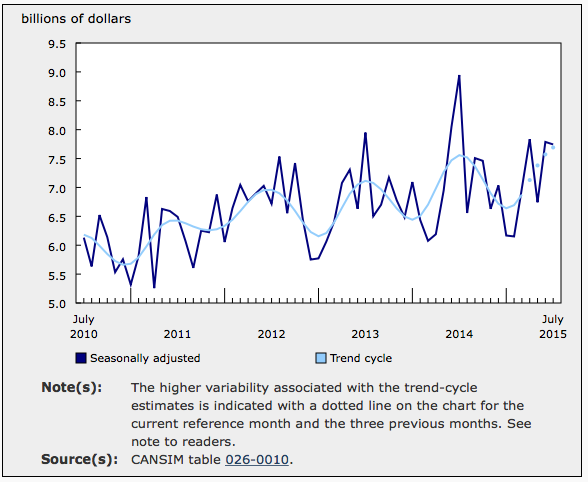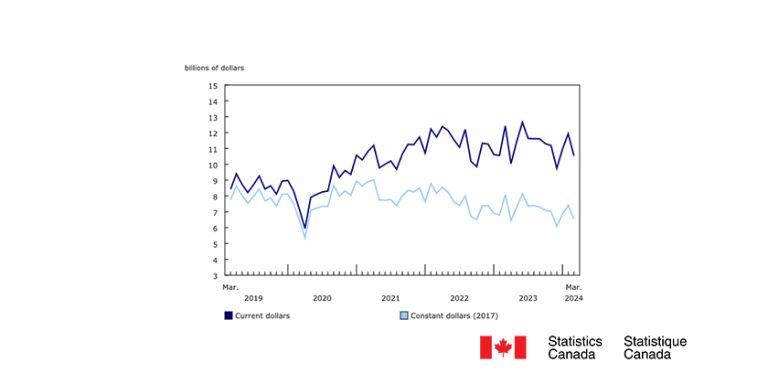July Building Permits Decline Slightly from June

Building permits issued by Canadian municipalities edged down 0.6% to $7.7 billion in July, following a 15.5% increase in June. Lower construction intentions in the non-residential sector, mainly in Ontario and Alberta, accounted for much of the decrease at the national level.
The value of permits for non-residential buildings fell 13.9% to $2.7 billion in July, following a 13.8% advance in June. Declines were recorded in six provinces, with Ontario and Alberta accounting for much of the decrease, followed by British Columbia. Saskatchewan saw the largest gain in the non-residential sector, followed by Yukon.
In the residential sector, the value of permits rose 8.7% to $5.0 billion in July, following a 16.7% increase the previous month. Gains were registered in four provinces, led by Ontario and British Columbia. Quebec reported the largest decline after posting a 39.9% increase in residential building construction intentions in June.
Chart 1: Total value of permits

Non-residential sector: Notable decline in the institutional component
The value of permits for institutional buildings declined 43.7% to $646 million in July, following a 32.1% increase the previous month. The decrease was due to lower construction intentions for educational institutions, medical facilities as well as retirement residences and residential care facilities. Declines were posted in six provinces, led by Ontario and Alberta. Manitoba registered the largest increase, followed by Yukon.
Municipalities issued $502 million worth of industrial building permits in July, down 6.7% from June. Nationally, the decrease stemmed from lower intentions for maintenance buildings. Construction intentions for industrial buildings fell in six provinces, with Quebec and Ontario behind most of the decline. Alberta recorded the largest advance among the remaining provinces, as a result of increased intentions for utilities buildings.
In the commercial component, the value of permits rose 6.1% to $1.6 billion in July, the fourth increase in five months. Higher permit values for recreational buildings, office buildings and service stations offset declines in retail and wholesale outlets, and warehouses. Increases were recorded in five provinces and two territories, led by Saskatchewan, Quebec and Alberta.
Residential sector: strong increase in construction intentions for multi-family dwellings
Contractors took out $2.5 billion worth of multi-family dwelling permits in July, up 14.3% from June. This increase followed a 37.0% advance the previous month. Gains were posted in four provinces, led by British Columbia and Ontario. Quebec and Nova Scotia recorded the largest drops in construction intentions for multi-family dwellings, after large increases the previous month.
The value of permits for single-family dwellings rose 3.6% to $2.5 billion, a second consecutive monthly increase. Advances in Ontario, Alberta, British Columbia and Nova Scotia more than offset declines in the remaining provinces, with Quebec and New Brunswick reporting the largest decreases.
Municipalities approved the construction of 19,555 new dwellings in July, up 10.6% from June. The increase came from both multi-family dwellings, which rose 13.5% to 13,384 new units, and single-family dwellings, which increased 4.8% to 6,171 new units.

Permit values down in six provinces
The total value of permits fell in six provinces in July. Alberta posted the largest decline, followed by Quebec, Ontario and Nova Scotia.
The decrease in Alberta was due to lower construction intentions for institutional buildings and, to a lesser extent, multi-family dwellings.
In Quebec, the decline came mainly from decreased intentions for multi-family dwellings and industrial buildings, both of which had recorded notable increases the previous month.
The decline in Ontario resulted from lower intentions for non-residential buildings, mostly institutional buildings and commercial structures. Higher construction intentions for residential buildings, particularly multi-family dwellings, partly offset the drop in the non-residential sector.
In Nova Scotia, the decrease stemmed mainly from multi-family dwellings, which posted a significant increase the previous month.
In contrast, British Columbia recorded the largest advance, followed by Saskatchewan and Yukon.
In British Columbia, the advance was attributable to higher construction intentions in the residential sector, particularly multi-family dwellings. In Saskatchewan, the increase came from commercial buildings and, to a lesser degree, institutional structures. In Yukon, higher construction intentions for commercial buildings, institutional buildings and multi-family dwellings were responsible for the gain.
Lower construction intentions in more than half of the census metropolitan areas
In July, the total value of building permits fell in 19 of the 34 census metropolitan areas, with Edmonton, Kitchener-Cambridge-Waterloo and Montreal registering the largest declines.
In Edmonton, the decrease was mainly the result of lower intentions for institutional buildings and multi-family dwellings, while in Kitchener-Cambridge-Waterloo, all three non-residential components were responsible for the decrease. In Montreal, the drop was attributable to lower construction intentions for multi-family dwellings, which had increased significantly the previous month.
Conversely, Vancouver posted the largest advance, mainly as a result of higher construction intentions for multi-family dwellings as well as single-family dwellings and institutional buildings. Regina followed, with higher intentions for commercial buildings, multi-family dwellings and industrial buildings.
Source: Statistics Canada, http://www.statcan.gc.ca/daily-quotidien/150909/dq150909a-eng.htm?cmp=mstatcan.










![Guide to the Canadian Electrical Code, Part 1[i] – A Road Map: 26 the Edition, Section 36 – High Voltage Installations](https://electricalindustry.ca/wp-content/uploads/2022/11/Guide-CE-Code-2.png)






